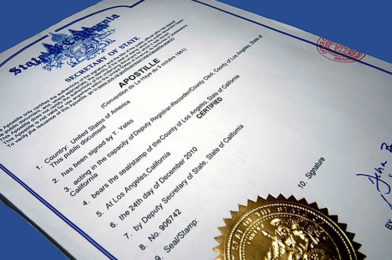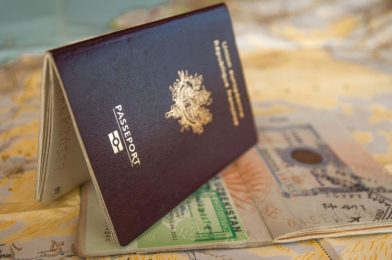For purpose of presenting in Ukraine official documents issued abroad, or official documents of Ukraine to other countries, such as extract from business register of companies, power of attorney, these documents are to be legalized in order to have legal validity in Ukraine.
There are 3 ways of legalization of documents.
a. Apostille
It is simplified legalization, available to countries, which entered Hague Convention Abolishing the Requirement of Legalization for Foreign Public Documents _Convention (the Apostille Convention).
The following countries are in the list according to the Apostille Convention: Albania, Andorra, Antigua and Barbuda, Argentina, Armenia, Australia, Austria, Azerbaijan, Bahamas, Bahrain, Barbados, Belarus, Belgium, Belize, Bosnia and Herzegovina, Botswana, Brazil, Brunei, Bulgaria, Burundi, Cape Verde, Chile, Colombia, Cook Islands, Costa Rica, Croatia, Cyprus, Czech Republic, Kingdom of Denmark, Dominica, Dominican Republic, Ecuador, El Salvador, Estonia, Fiji, Finland, France, Georgia, Germany, Greece, Grenada, Cyprus, Honduras, Guatemala, Hungary, Iceland, India, Ireland, Israel, Italy, Japan, Kazakhstan, Kosovo (but Ukraine objected to accession of Kosovo to Convention, so classical legalization between the countries are required), Kyrgyzstan, Latvia, Lesotho, Liberia, Liechtenstein, Lithuania, Luxembourg, Macau, Macedonia, Malawi, Malta, Marshall Islands, Mauritius, Mexico, Moldova, Monaco, Mongolia, Montenegro, Morocco, Namibia, Kingdom of the Netherlands, New Zealand, Nicaragua, Niue, Norway, Oman, Panama, Paraguay, Peru, Poland, Portugal, Romania, Russia, Saint Kitts and Nevis, Saint Lucia, Saint Vincent and the Grenadines, Samoa, San Marino, São Tomé and Príncipe, Serbia, Seychelles, Slovakia, Slovenia, South Africa, South Korea, Spain, Suriname, Swaziland, Sweden, Switzerland, Tonga, Trinidad and Tobago, Turkey, Ukraine, United Kingdom, United States, Uruguay, Uzbekistan, Vanuatu, Venezuela.
Double apostille
Some countries require 2 apostilles on official documents, first on document, second on notary certified translation of already apostilled document. These countries are Austria, Belgium, Spain, France, United Kingdom, Portugal, Switzerland, the Netherlands and Italy.
b. Notarization of the copy
The most simple way of document legalization is notary certification. List of countries which concluded mutual legal assistance treaties according to which the simple notary copy in country of issuance is sufficient for state bodies of Ukraine is as follows: Algeria, states from former Republic of Yugoslavia, Estonia, Kyrgyzstan, North Korea, Latvia, Lithuania, Mongolia, Azerbaijan, Albania, Belarus, Armenia, Bulgaria, Georgia, Kazakhstan, Cuba, Moldova, Poland (for Ukrainian documents Poland requires apostille), Turkey, Uzbekistan, Tadzhikistan, Russia (for Ukrainian documents Russia requires apostille), Romania, Slovakia, Vietnam, Turkmenistan, Hungary, Czech Republic (for Ukrainian documents Czech Republic requires apostille). Means that even if the country is in the list above as member of Apostille Convention, no apostille is needed if the mutual legal assistance treaty is concluded.
c. Legalization
Means classical legalization of document through embassy. If the country of official document issuance is not in any of the lists above, the legalization is needed. It involves Embassy certification, which is more time consuming. These are such countries as Abkhazia, Angola, Afghanistan, Bangladesh, Benin, Burkina Faso, Burundi, Bhutan, Vatican City, Timor East, Gabon, Haiti Guyana Gambia Ghana Guatemala, Guinea Guinea-Bissau, Djibouti Egypt Zambia Zimbabwe Indonesia Jordan Iraq Iran Yemen Cambodia Cameroon Canada Qatar Kenya Comoros Congo Korea D.P.R. Cote d’Ivoire Kuwait Lao P.D.R. Lebanon, Libyan Arab Jamahiriya, Mauritania Madagascar Malaysia Mali Maldives, Federated States of Micronesia, Myanmar, Nauru, Nepal, Niger, Nigeria, Nicaragua, United Arab Emirates, Pakistan Palau Palestine, Papua New Guinea, Rwanda, Saudi Arabia, Senegal, Singapore, Syria, Solomon Islands, Somalia, Sudan, Sierra Leone, Thailand, Taiwan, Tanzania, Togo, Tuvalu, Tunisia, Uganda, Philippines, Central African Republic, Chad, Sri Lanka, Equatorial Guinea, Eritrea, Ethiopia, South Ossetia, South Sudan, Jamaica.





